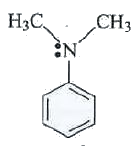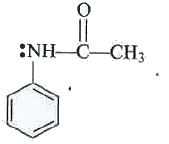Which of the following compounds can give E1cB reaction ?
CF3−CHCl2
C6H5−C∣NO2H−CH2F
CH3−CH2−CH2Br
C6H5−C∣OHH−CH2−CHO
The correct Answer is:A, B, D
To determine which of the given compounds can undergo an E1cB reaction, we first need to understand the mechanism of E1cB reactions. E1cB stands for "Elimination Unimolecular via Conjugate Base." This mechanism typically occurs when a compound has a beta hydrogen that can be abstracted by a base, leading to the formation of a stabilized carbanion intermediate.
1. Identify the Compounds:
We have four compounds to analyze:
- A: CH3-CH(Br)-CH2-CH3
- B: C6H5-CH(NO2)-CH2F
- C: CH3-CH2-CH2-Br (Bromopropane)
- D: C6H5-CHOH-CH2-CHO
2. Check for Beta Hydrogens:
For an E1cB reaction to occur, the compound must have a beta hydrogen that can be abstracted by a base.
- A: CH3-CH(Br)-CH2-CH3 has beta hydrogens.
- B: C6H5-CH(NO2)-CH2F has beta hydrogens.
- C: CH3-CH2-CH2-Br has beta hydrogens.
- D: C6H5-CHOH-CH2-CHO has beta hydrogens.
3. Assess Stabilization of the Carbanion:
The carbanion formed after the abstraction of the beta hydrogen must be stabilized by resonance or inductive effects.
- A: After abstraction, the carbanion is stabilized by the -I effect of bromine. Thus, it can undergo E1cB.
- B: The carbanion can be stabilized by resonance from the nitro group and the -I effect of fluorine. Thus, it can undergo E1cB.
- C: The carbanion formed here is not stabilized by any strong electron-withdrawing groups or resonance. Therefore, it will not undergo E1cB but will likely proceed via E2.
- D: The carbanion can be stabilized by resonance with the phenyl group and the adjacent carbonyl. Thus, it can undergo E1cB.
4. Conclusion:
The compounds that can undergo E1cB reactions are:
- A: CH3-CH(Br)-CH2-CH3
- B: C6H5-CH(NO2)-CH2F
- D: C6H5-CHOH-CH2-CHO
- C (Bromopropane) cannot undergo E1cB.
Final Answer:
The compounds that can give E1cB reactions are A, B, and D.
We have four compounds to analyze:
- A: CH3-CH(Br)-CH2-CH3
- B: C6H5-CH(NO2)-CH2F
- C: CH3-CH2-CH2-Br (Bromopropane)
- D: C6H5-CHOH-CH2-CHO
For an E1cB reaction to occur, the compound must have a beta hydrogen that can be abstracted by a base.
- A: CH3-CH(Br)-CH2-CH3 has beta hydrogens.
- B: C6H5-CH(NO2)-CH2F has beta hydrogens.
- C: CH3-CH2-CH2-Br has beta hydrogens.
- D: C6H5-CHOH-CH2-CHO has beta hydrogens.
The carbanion formed after the abstraction of the beta hydrogen must be stabilized by resonance or inductive effects.
- A: After abstraction, the carbanion is stabilized by the -I effect of bromine. Thus, it can undergo E1cB.
- B: The carbanion can be stabilized by resonance from the nitro group and the -I effect of fluorine. Thus, it can undergo E1cB.
- C: The carbanion formed here is not stabilized by any strong electron-withdrawing groups or resonance. Therefore, it will not undergo E1cB but will likely proceed via E2.
- D: The carbanion can be stabilized by resonance with the phenyl group and the adjacent carbonyl. Thus, it can undergo E1cB.
The compounds that can undergo E1cB reactions are:
- A: CH3-CH(Br)-CH2-CH3
- B: C6H5-CH(NO2)-CH2F
- D: C6H5-CHOH-CH2-CHO
- C (Bromopropane) cannot undergo E1cB.
The compounds that can give E1cB reactions are A, B, and D.
Topper's Solved these Questions
- ORGANIC REACTION MECHANISMS-IVBOOK - RESONANCE ENGLISHCHAPTER - ORGANIC REACTION MECHANISMS-IVEXERCISE - Exercise-2 Part-4
8 Videos
- ORGANIC REACTION MECHANISMS-IVBOOK - RESONANCE ENGLISHCHAPTER - ORGANIC REACTION MECHANISMS-IVEXERCISE - Exercise-3 Part-1
18 Videos
- ORGANIC REACTION MECHANISMS-IVBOOK - RESONANCE ENGLISHCHAPTER - ORGANIC REACTION MECHANISMS-IVEXERCISE - Exercise-2 Part-2
7 Videos
- ORGANIC REACTION MECHANISMS - IIBOOK - RESONANCE ENGLISHCHAPTER - ORGANIC REACTION MECHANISMS - IIEXERCISE - APSP Part - 3
22 Videos
- PERIODIC TABLE & PERIODICITYBOOK - RESONANCE ENGLISHCHAPTER - PERIODIC TABLE & PERIODICITYEXERCISE - ORGANIC CHEMISTRY(BASIC CONCEPTS)
27 Videos
Similar Questions
Knowledge Check
Which of the following compounds will give E1 reaction?
A BPh−Br∣CH−CH3CH2C=CH−Cl∣CH−CH3D
BPh−Br∣CH−CH3CH2C=CH−Cl∣CH−CH3D
Which of the following compounds cannot give E2 reaction with strong base?
A B
B C
C D
D
Which of the following compounds can give coupling reaction with benzene diazonium salt ?
A B
B C
C D
D
Which of the following compounds will give HVZ reaction?
View SolutionWhich of the following compounds may give reaction with acidic KMnO4 ?
View SolutionWhich of the following compounds will give SN1 reaction?
View SolutionWhich of the following compounds give alcohol on reaction with RMgX?
View SolutionWhich of the following compounds give faster EAS reaction than benzene ?
View Solution